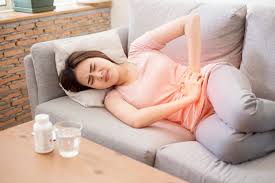Menstrual cramps, also known as dysmenorrhea, are a common discomfort experienced by many women during their menstrual cycle. While they can vary in intensity, these cramps can disrupt daily activities and cause significant discomfort.
Fortunately, www.Pristinegist.com met different medical and health professionals to seek for the solution to the problem.
However, there are several effective methods to reduce menstrual cramps and alleviate the associated pain. In this article, we will explore some practical strategies to help you find relief.
Apply Heat:
Applying heat to the abdominal area is a simple yet effective way to alleviate menstrual cramps. You can use a heating pad, hot water bottle, or even take a warm bath. The heat helps relax the contracting muscles in the uterus, providing relief from pain and discomfort.
Exercise Regularly:
Engaging in regular physical activity can help reduce menstrual cramps by increasing blood flow and releasing endorphins, which act as natural pain relievers. Light exercises such as walking, jogging, yoga, or stretching are particularly beneficial. Aim for at least 30 minutes of moderate exercise on most days of the week.
Try Herbal Remedies:
Certain herbs have been traditionally used to relieve menstrual cramps. For example, ginger has anti-inflammatory properties that can help reduce pain. You can consume it as tea or add it to your meals. Another herb, cramp bark, has been used for centuries to relax uterine muscles. Consult with a healthcare professional before trying any herbal remedies to ensure they are safe for you.
Stay Hydrated:
Drinking an adequate amount of water is crucial for overall health and can also help alleviate menstrual cramps. Staying hydrated helps maintain proper blood circulation and prevents bloating, which can exacerbate cramps. Aim for at least eight glasses of water per day and limit your consumption of caffeinated beverages, which can contribute to dehydration.
Use Over-the-Counter Pain Relievers:
Over-the-counter nonsteroidal anti-inflammatory drugs (NSAIDs), such as ibuprofen or naproxen sodium, can effectively reduce menstrual cramps. These medications work by inhibiting the production of prostaglandins, which are responsible for causing pain and inflammation. Always follow the recommended dosage and consult your healthcare provider if you have any concerns.
Practice Relaxation Techniques:
Stress and tension can intensify menstrual cramps. Incorporating relaxation techniques into your routine can help reduce both physical and emotional discomfort. Consider practices such as deep breathing exercises, meditation, mindfulness, or gentle massages to promote relaxation and ease the pain.
Maintain a Healthy Diet:
Eating a well-balanced diet can have a positive impact on menstrual cramps. Incorporate foods rich in omega-3 fatty acids, such as fatty fish (salmon, mackerel) and flaxseeds, as they possess anti-inflammatory properties. Additionally, reduce your intake of processed foods, refined sugars, and saturated fats, as they can exacerbate inflammation and bloating.
Conclusion:
Menstrual cramps can be disruptive and painful, but there are effective ways to manage and reduce them. By applying heat, engaging in regular exercise, trying herbal remedies, staying hydrated, using over-the-counter pain relievers, practicing relaxation techniques, and maintaining a healthy diet, you can alleviate the discomfort and make your menstrual cycle more bearable. Remember, it’s always essential to consult with a healthcare professional for personalized advice and guidance.
Please note that the information provided in this article is not a substitute for medical advice. If you experience severe or persistent menstrual cramps, it is recommended to consult with a healthcare professional for a proper diagnosis and appropriate treatment options.



